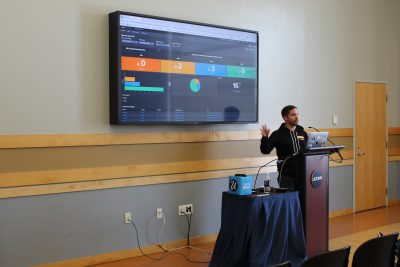 On Friday, March 8th, OPIM Innovate hosted Splunk Day in collaboration with Splunk, Inc., the industry leader in operations analytics software. Held in the Student Union, the six-hour event introduced students and faculty to the Splunk software, Splunk’s organizational culture, and ways to get involved with the company and their various applications. The event was kicked-off by Ryan O’Connor, Senior Advisory Engineer at Splunk and adjunct professor of the Operations and Information Management Department at the UConn School of Business. To give attendees an understanding of what Splunk can do, O’Connor introduced the software and its capabilities as both a data-visualization tool and a data-monitoring platform.
On Friday, March 8th, OPIM Innovate hosted Splunk Day in collaboration with Splunk, Inc., the industry leader in operations analytics software. Held in the Student Union, the six-hour event introduced students and faculty to the Splunk software, Splunk’s organizational culture, and ways to get involved with the company and their various applications. The event was kicked-off by Ryan O’Connor, Senior Advisory Engineer at Splunk and adjunct professor of the Operations and Information Management Department at the UConn School of Business. To give attendees an understanding of what Splunk can do, O’Connor introduced the software and its capabilities as both a data-visualization tool and a data-monitoring platform.
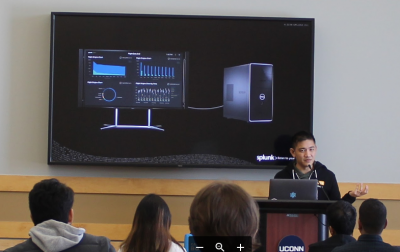 After O’Connor’s brief introduction of Splunk, Glen Wong, Senior Engineering Manager at Splunk, took to the podium to give attendees an inside look at the endeavors of the Splunk Mobile Team. The Mobile Team’s mission is to make Splunk accessible, not just on laptops and desktops, but also on phones, tablets, televisions, smart watches, and so on. With applications like Splunk Mobile, Splunk users can pull up useful dashboards and receive notifications and alerts when pertinent changes are made to their unique Splunk environment. Splunk TV, another application developed by the Mobile Team for Apple TV, specifically, allows users to pull up multiple saved dashboards and search through data using voice recognition.
After O’Connor’s brief introduction of Splunk, Glen Wong, Senior Engineering Manager at Splunk, took to the podium to give attendees an inside look at the endeavors of the Splunk Mobile Team. The Mobile Team’s mission is to make Splunk accessible, not just on laptops and desktops, but also on phones, tablets, televisions, smart watches, and so on. With applications like Splunk Mobile, Splunk users can pull up useful dashboards and receive notifications and alerts when pertinent changes are made to their unique Splunk environment. Splunk TV, another application developed by the Mobile Team for Apple TV, specifically, allows users to pull up multiple saved dashboards and search through data using voice recognition.
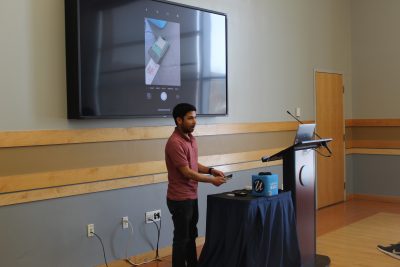 During the Splunk Mobile presentation, Devin Bhushan, Senior iOS Engineer for augmented reality (AR), showed audience members a live Splunk AR demo. Augmented reality is an emerging technology that superimposes digital modules, animations, images, and videos onto the real world through a mobile device. For Splunk AR, various augmented reality modules can be placed onto the physical environment through the use of a near field communication (NFC) tag. The NFC tag holds the information of a specific Splunk dashboard, and gives Splunk AR users the ability to see how that data is changing in real time. For example, if Splunk is capturing how hot a certain device is, Splunk AR can place a digital temperature gauge on that device. This versatile technology can also be used in manufacturing to track the movement of inventory.
During the Splunk Mobile presentation, Devin Bhushan, Senior iOS Engineer for augmented reality (AR), showed audience members a live Splunk AR demo. Augmented reality is an emerging technology that superimposes digital modules, animations, images, and videos onto the real world through a mobile device. For Splunk AR, various augmented reality modules can be placed onto the physical environment through the use of a near field communication (NFC) tag. The NFC tag holds the information of a specific Splunk dashboard, and gives Splunk AR users the ability to see how that data is changing in real time. For example, if Splunk is capturing how hot a certain device is, Splunk AR can place a digital temperature gauge on that device. This versatile technology can also be used in manufacturing to track the movement of inventory.
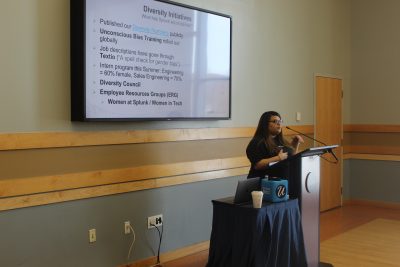 On the topic of Splunk’s organizational culture, the next presentation centered around Women in Technology. Khadija Yamin, a Splunk Sales Engineer, started this part of the event with a few important statistics. For one, there are currently only about 26% of women in technology-related fields, with female minorities being even less represented. In addition, 56% of women in technical fields leave their jobs at the mid-level, which is a very costly point in time for an organization to lose an employee. What Splunk does to avoid this is to promote an inclusive culture, which is encouraged by mandatory unconscious bias training. They also regularly utilize textio, described by Yamin as “a spell check for gender bias,” for written communication. Though, to Yamin, inclusivity has to be present in the lives of women and other minorities pursuing roles in the technological field even before they reach Splunk to be the most effective. When I asked Yamin what both men and women can do at the college level to support women who want to pursue technological roles, she stated: “Stay involved with your female colleagues and classmates, don’t make derogatory jokes, and be respectful of the pursuits of both sexes. You can’t look at a person and expect them to not understand something because they are female or male. You have to look beyond that–we are equally capable human beings.”
On the topic of Splunk’s organizational culture, the next presentation centered around Women in Technology. Khadija Yamin, a Splunk Sales Engineer, started this part of the event with a few important statistics. For one, there are currently only about 26% of women in technology-related fields, with female minorities being even less represented. In addition, 56% of women in technical fields leave their jobs at the mid-level, which is a very costly point in time for an organization to lose an employee. What Splunk does to avoid this is to promote an inclusive culture, which is encouraged by mandatory unconscious bias training. They also regularly utilize textio, described by Yamin as “a spell check for gender bias,” for written communication. Though, to Yamin, inclusivity has to be present in the lives of women and other minorities pursuing roles in the technological field even before they reach Splunk to be the most effective. When I asked Yamin what both men and women can do at the college level to support women who want to pursue technological roles, she stated: “Stay involved with your female colleagues and classmates, don’t make derogatory jokes, and be respectful of the pursuits of both sexes. You can’t look at a person and expect them to not understand something because they are female or male. You have to look beyond that–we are equally capable human beings.”
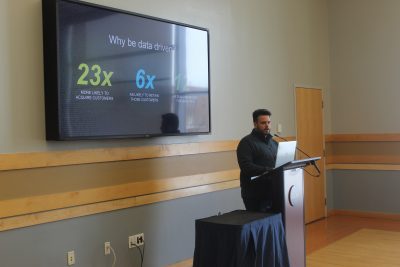 For Brian Gilmore, Splunk’s Chief Technology Advocate and speaker for the Industrial Internet of Things (IoT) portion of Splunk Day, a pattern he consistently faced in his early professional career was that useful data was not being explored by systems specialists. During his time at the Georgia Aquarium as an aquarist and life support manager, for example, he found that the automation control systems that kept “the animals healthy and the water clear” were not being utilized for business insight. As a result, he built connectivity to those systems, which controlled all tank valves, filters, sensors, and activators, by creating a way to feed that data into Excel. When he began to work with Splunk, he sought to use the Splunk platform as a more efficient medium between the machine and the man, which is basically what Internet of Things is all about.
For Brian Gilmore, Splunk’s Chief Technology Advocate and speaker for the Industrial Internet of Things (IoT) portion of Splunk Day, a pattern he consistently faced in his early professional career was that useful data was not being explored by systems specialists. During his time at the Georgia Aquarium as an aquarist and life support manager, for example, he found that the automation control systems that kept “the animals healthy and the water clear” were not being utilized for business insight. As a result, he built connectivity to those systems, which controlled all tank valves, filters, sensors, and activators, by creating a way to feed that data into Excel. When he began to work with Splunk, he sought to use the Splunk platform as a more efficient medium between the machine and the man, which is basically what Internet of Things is all about.
Internet of Things, in an industrial context, is connecting any data-generating device to the internet for efficiency and insight. Splunk assists many companies in this area of emerging technology by giving them the data necessary to optimize their business models, minimize costs and generate optimal revenues. For example, Dubai Airlines partnered with Splunk to optimize their customer service model and keep track of utility usage. Due to this implementation and the data collected from customer checkpoints, Dubai Airlines can now get a customer from the front door to their gate in five minutes. They can also restock toiletries, such as hand soap, paper towels, and toilet paper, in a timely manner due to IoT sensors on toilets and sinks.
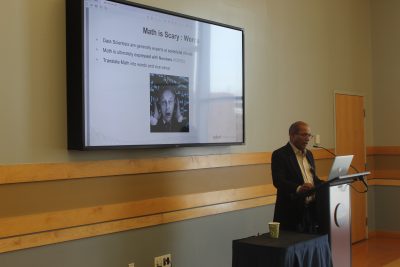
According to Rao Durvasula, Senior Instructor at Splunk and the presenter of the Machine Learning portion of Splunk Day, “You’re not a data scientist if you can’t articulate the problem in English.” So, when it comes to Splunk Analytics and its Machine Learning Toolkit, exploration is the best method for implementation. The moment you install Splunk, you can utilize the Machine Learning Toolkit as a free add-on to explore predictive analytics such as linear regression and logistic regression. These algorithms help you create future insights from present and past data and can assist you in making business decisions. In addition, the Toolkit gives you an opportunity to start understanding predictive models and machine learning for future communication.
As we have seen, Splunk can be used in a variety of ways, from gathering IoT information to making machine learning predictions. However, its capabilities do not stop there–it can also be used as a security client. During the Security portion of Splunk Day, Khadija Yamin returned to explain Splunk Enterprise Security, which helps organizations identify security concerns. For users who have the regular version of Splunk, Splunk Enterprise, they can install Splunk Security Essentials, a free add-on that helps detect security anomalies. As it takes, on average, 146 days for organizations to find out if they were hacked, having a security client is very necessary. And, Splunk Enterprise Security has been the top in Security Information and Event Management for 6 years, meaning that they are the optimal choice.
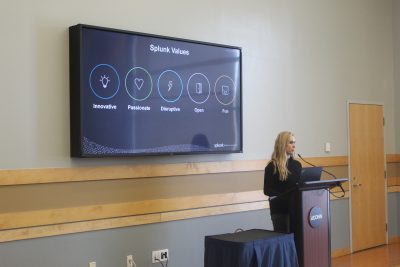 At the end of the informative portion of Splunk Day, the final presenter, University Recruiting Manager Katia Ratkovitch, described the “Perfect Splunker.” They are a person who is a team player, who enjoys building (or innovating), who is inclusive, who values personal growth, and who takes action when other people don’t. The Splunk environment thrives off of these individuals, and thus holds the values of being innovative, passionate, disruptive (ahead of the competition), open, and fun. If you are interested in this type of environment, consider Splunk’s 10-12 week internship program! Every intern has a mentor, works on a real-world project with a real-world team, and participates in fun events like a one-week hackathon. While most internship positions have been filled for the summer of 2019, please feel free to browse their internships and full-time positions for future opportunities.
At the end of the informative portion of Splunk Day, the final presenter, University Recruiting Manager Katia Ratkovitch, described the “Perfect Splunker.” They are a person who is a team player, who enjoys building (or innovating), who is inclusive, who values personal growth, and who takes action when other people don’t. The Splunk environment thrives off of these individuals, and thus holds the values of being innovative, passionate, disruptive (ahead of the competition), open, and fun. If you are interested in this type of environment, consider Splunk’s 10-12 week internship program! Every intern has a mentor, works on a real-world project with a real-world team, and participates in fun events like a one-week hackathon. While most internship positions have been filled for the summer of 2019, please feel free to browse their internships and full-time positions for future opportunities.
Following of Splunk Day, students began to network with the various Splunk employees that presented during the event. One of these students was Joanne Cheong (MIS ’19), a Lab Specialist at OPIM Innovate who enthusiastically agreed to tell me about her experience. “Splunk day provided me with great insight on what the company does. I already knew about Splunk from the tech kits I write for the Innovate Lab, but I learned a lot more about how Splunk can be used in areas like operational intelligence and cybersecurity. And, given that I’m a [Management Information Systems] major, it’s great to have a platform where you can experiment with data for different purposes.”
Splunk, as an organization, tries its best to promote social change and stimulate personal growth. It is no wonder their motto for employees is, “If you’re not growing, you’re dying”–growth is something they strive for, not just for themselves but for the communities around them. Through Splunk4Good, Splunk sponsors various educational institutions, including UConn, to give students the ability to build valuable skillsets while learning to use the Splunk Analytics platform. That way, they can use Splunk, and their understanding of data analytics, to positively influence the progress and growth of various organizations striving to make an impact.
If you would like to learn more about Splunk, I encourage you to take Splunk Fundamentals I and II. They are free Splunk courses for UConn students, and give you a first step towards an amazing skillset.
 Growing up in Milford, Connecticut, junior management information systems (MIS) major
Growing up in Milford, Connecticut, junior management information systems (MIS) major  On Friday, March 8th, OPIM Innovate hosted Splunk Day in collaboration with Splunk, Inc., the industry leader in operations analytics software. Held in the Student Union, the six-hour event introduced students and faculty to the Splunk software, Splunk’s organizational culture, and ways to get involved with the company and their various applications. The event was kicked-off by
On Friday, March 8th, OPIM Innovate hosted Splunk Day in collaboration with Splunk, Inc., the industry leader in operations analytics software. Held in the Student Union, the six-hour event introduced students and faculty to the Splunk software, Splunk’s organizational culture, and ways to get involved with the company and their various applications. The event was kicked-off by  After O’Connor’s brief introduction of Splunk,
After O’Connor’s brief introduction of Splunk,  During the Splunk Mobile presentation,
During the Splunk Mobile presentation,  On the topic of Splunk’s organizational culture, the next presentation centered around Women in Technology.
On the topic of Splunk’s organizational culture, the next presentation centered around Women in Technology.  For
For 
 At the end of the informative portion of Splunk Day, the final presenter, University Recruiting Manager
At the end of the informative portion of Splunk Day, the final presenter, University Recruiting Manager 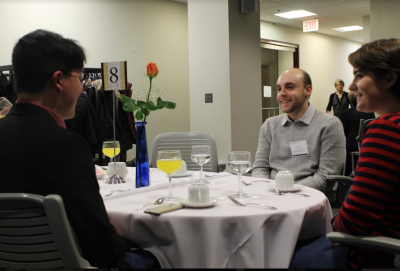 On Thursday, March 7th, the UConn Operations & Information Management (OPIM) Department held its third annual OPIM Alumni & Student Networking Dinner. The event, held at the UConn Graduate Business Learning Center, was attended by 12 alumni, 8 faculty, and 22 students, all with a background in management information systems (MIS), business data analytics (BDA), and/or business technology (BT). During the dinner, students table-hopped after each course of the meal (three in total) and networked with professionals from a variety of fields. The event was meant to promote professional development by placing students in an environment where they could network with UConn alums, receive advice, and develop valuable professional relationships.
On Thursday, March 7th, the UConn Operations & Information Management (OPIM) Department held its third annual OPIM Alumni & Student Networking Dinner. The event, held at the UConn Graduate Business Learning Center, was attended by 12 alumni, 8 faculty, and 22 students, all with a background in management information systems (MIS), business data analytics (BDA), and/or business technology (BT). During the dinner, students table-hopped after each course of the meal (three in total) and networked with professionals from a variety of fields. The event was meant to promote professional development by placing students in an environment where they could network with UConn alums, receive advice, and develop valuable professional relationships.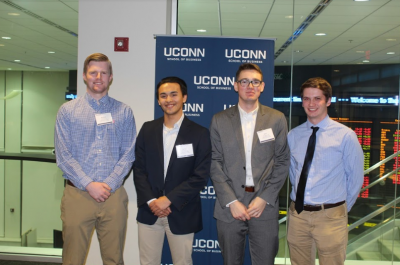 As for the perspective of current students, many MIS majors who attended the dinner left with a greater understanding of the information technology industry, the skills desired by certain companies, and interview advice. “The event really helped with my networking skills,” said
As for the perspective of current students, many MIS majors who attended the dinner left with a greater understanding of the information technology industry, the skills desired by certain companies, and interview advice. “The event really helped with my networking skills,” said 
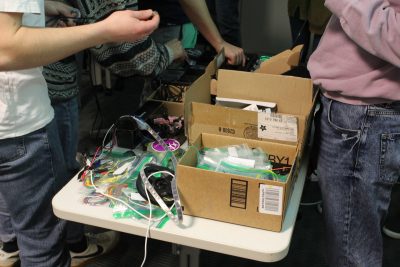 On Friday, March 1st, OPIM Innovate hosted its Wearable Tech in Action workshop from 1:00 PM to 3:00 PM in the Gladstein Lab. There, students were able to use hardware such as FLORA microcontrollers, UV light sensors, and force sensors to design their own wearable technologies with pre-coded software templates created using Arduino, an open-source electronic prototyping software. There were multiple projects students could choose from based on the parts they selected from the toolkit supplied by the event instructor. Encouraged to work on their own, students downloaded the Arduino software, began building their wearable technologies, and experimented with changing light colors and cycle times by altering the code provided to them on the workshop’s
On Friday, March 1st, OPIM Innovate hosted its Wearable Tech in Action workshop from 1:00 PM to 3:00 PM in the Gladstein Lab. There, students were able to use hardware such as FLORA microcontrollers, UV light sensors, and force sensors to design their own wearable technologies with pre-coded software templates created using Arduino, an open-source electronic prototyping software. There were multiple projects students could choose from based on the parts they selected from the toolkit supplied by the event instructor. Encouraged to work on their own, students downloaded the Arduino software, began building their wearable technologies, and experimented with changing light colors and cycle times by altering the code provided to them on the workshop’s 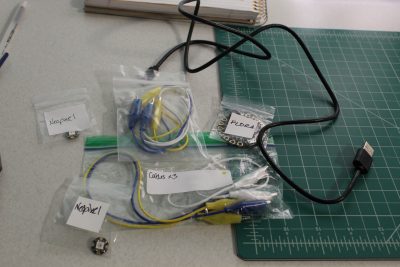 Since this was the first time I had ever created a wearable piece of technology, I decided to build an accessory that utilized a FLORA microcontroller and a neopixel light. Thanks to the diagrams available to us when using the GitHub tutorials, it was not that difficult to put together. In all, it took one micro USB cord connected to my laptop to power the FLORA microcontroller and upload the Arduino code. From there, I had to use three alligator clips and three on-board pads, or points of contact between devices, on both the FLORA microcontroller and the neopixel light to individuate the electric pulses that would make the device work properly given the current code. Once everything was connected, the neopixel light began to cycle through different colors. At first, the device ran on a red, green, and blue cycle. Then I changed the colors to aqua blue, purple, and pastel pink.
Since this was the first time I had ever created a wearable piece of technology, I decided to build an accessory that utilized a FLORA microcontroller and a neopixel light. Thanks to the diagrams available to us when using the GitHub tutorials, it was not that difficult to put together. In all, it took one micro USB cord connected to my laptop to power the FLORA microcontroller and upload the Arduino code. From there, I had to use three alligator clips and three on-board pads, or points of contact between devices, on both the FLORA microcontroller and the neopixel light to individuate the electric pulses that would make the device work properly given the current code. Once everything was connected, the neopixel light began to cycle through different colors. At first, the device ran on a red, green, and blue cycle. Then I changed the colors to aqua blue, purple, and pastel pink.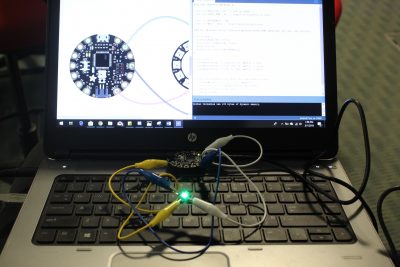 As I continued to experiment with my wearable accessory, I found that you could do various things with the code. For one, you could decrease the brightness of the lights, or even add an extra color to the current hue loop. Looking around me, I also saw my peers use Arduino to create color waves utilizing the neopixel strip, which carries 60 individual neopixels inside of it. Light traveled up and down the strip in a single color, something that could have become a rainbow arrangement with a little extra time.
As I continued to experiment with my wearable accessory, I found that you could do various things with the code. For one, you could decrease the brightness of the lights, or even add an extra color to the current hue loop. Looking around me, I also saw my peers use Arduino to create color waves utilizing the neopixel strip, which carries 60 individual neopixels inside of it. Light traveled up and down the strip in a single color, something that could have become a rainbow arrangement with a little extra time.